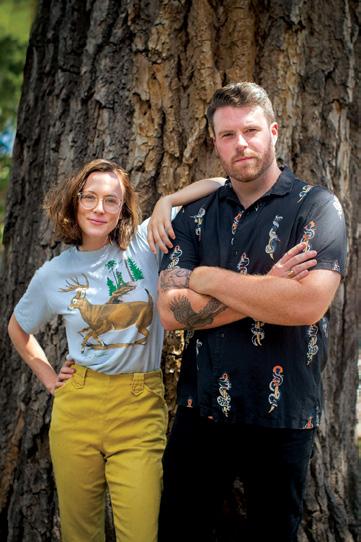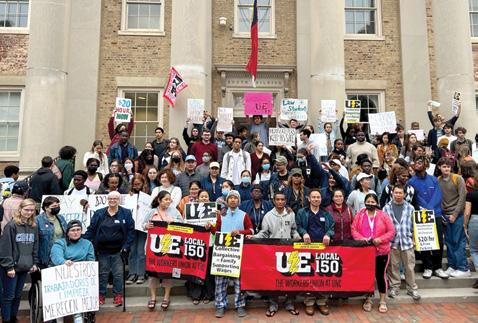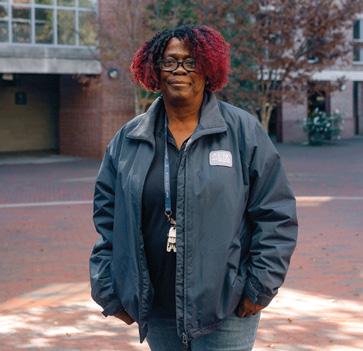
4 As they have many times in the past, UNC housekeepers are demanding better pay and working conditions. This time, they're taking aim at North Carolina's anti-union laws, too.
BY LIA SALVATIERRA
6 Volunteers are seeking out instances of racism written into historic Durham land deeds.
BY NATE HOPKINS
8 Durham will restart its Children's Defense Fund "Freedom Schools" program this summer.
BY THOMASI MCDONALD
10 Officials at Shaw University filed a federal civil rights complaint over a South Carolina traffic stop that saw students' luggage searched while they were on a field trip. BY THOMASI
MCDONALD
ARTS & CULTURE
12 With new film The Fabelmans, Steven Spielberg gets personal.
BY GLENN MCDONALD
13 In Laura Jaramillo's Making Water, time is a terrible and beautiful thing.
BY KATIE MGONGOLWA
14 "The selkie story itself is a story of otherness," says Violet Bell's Lizzy Ross, on the folktale at the heart of the band's new album. "It’s a story of having to shrink one’s identity into the acceptable space in order to survive."
 BY JORDAN LAWRENCE
BY JORDAN LAWRENCE
2 November 30, 2022 INDYweek.com
NEWS
COVER Photo by Brett Villena / Design by Nicole Pajor Moore
CONTENTS THE REGULARS 3 Backtalk 16 Culture Calendar
Raleigh W Durham W Chapel Hill VOL. 39 NO. 48
Chatham Rabbits perform at Lincoln Theatre on Sunday, December 4. (See calendar, page 16.)
W E M A D E T H I S PUBLISHER John Hurld EDITORIAL Editor in Chief Jane Porter Managing Editor Geoff West Arts & Culture Editor Sarah Edwards Staff Writers Jasmine Gallup Thomasi McDonald Lena Geller Copy Editor Iza Wojciechowska Interns Chad Knuth, Lia Salvatierra Nathan Hopkins Contributors Spencer Griffith, Brian Howe, Kyesha Jennings, Jordan Lawrence, Glenn McDonald, Nick McGregor, Gabi Mendick, Shelbi Polk, Dan Ruccia, Rachel Simon, Byron Woods CREATIVE Creative Director Nicole Pajor Moore Graphic Designer Jon Fuller Staff Photographer Brett Villena ADVERTISING Publisher John Hurld Sales Digital Director & Classifieds Mathias Marchington CIRCULATION Berry Media Group MEMBERSHIP/ SUBSCRIPTIONS John Hurld INDY Week | indyweek.com P.O. Box 1772 • Durham, N.C. 27702 Durham 320 East Chapel Hill Street, #200 Durham, N.C. 27701 | 919-286-1972 Raleigh: 16 W Martin St, Raleigh, N.C. 27601 EMAIL ADDRESSES first initial[no space]last name@indyweek.com
SALES
Raleigh 919-832-8774 Durham
permission.
PHOTO COURTESY OF LINCOLN THEATRE
ADVERTISING
advertising@indyweek.com
919-286-1972 Classifieds 919-286-6642 Contents © 2022 ZM INDY, LLC All rights reserved. Material may not be reproduced without
B A C K T A
“RE: Eastern NC, have been having a lot of conversations about this topic since the election and even before. We need to scale up programs that already exist from orga nizations like Down Home, New Rural Proj ect, New NC Project, NCLCV Foundation, and A. Philip Randolph Institute. They’re already on the ground doing the work to reg ister and regularly communicate with voters of color and white rural voters who might align with progressive values, but they don’t have enough money to hire enough staff to recruit and train enough volunteers and knock enough doors. The Democratic Party also needs to have a permanent field opera tion of its own across the state to amplify the work its elected leaders are doing in the field and then shift those organizers to GOTV close to elections. Then candidate campaigns can focus on persuading swing voters. Hav ing this permanent campaign is also a way to address the talent drain and seasonal nature of campaign work that has plagued NC progressive infrastructure for so long. We need to keep NC people who want to do good work in NC if they want to stay here. To do that, they need to also be compensated well and allowed to unionize.”
Ingalls’s comments got some traction on Twitter, especially the part about how GOTV volunteers should be paid well and allowed to unionize if Dems want them to stay here.
“That last sentence!!!,” wrote THE NEW NORTH CAROLINA PROJECT. “If we are going to show up for North Carolina, we need dignified wages and benefits for our working class.”
“The @NCDemParty actually HAD their first year-round field team ready for 2022, but a lack of coordinated planning ended up derailing that team to the point it had to be dissolved,” wrote commenter TYLER BEALL. “After unionizing - and new leader ship - we will hopefully see more consistent organizing #ncpol.”
“To put them in the field all year every year will require enough fundraising to pay them a decent wage,” wrote commenter VICKI BOYER. “And may require fewer contractors at Goodwin House & a salary for the Chair. SEC meeting going to be interesting.”
“This is perfectly logical,” wrote comment er ELIZABETH LEIGH COULTER. “Unfor tunately, the NCDP is a concentrated pool of ineptitude and behind about 50 years in having a statewide ground game.”




“So proud of the work @NewRuralProject did this past election cycle!!,” wrote comment er JAMIE HILDRETH. “These organizations need more support !”

Read the rest of the comments on Twitter and sign up for our Daily news letter at indyweek.com/newsletters.
—Jane Porter
Love the ? Support the businesses that support us... Shop local!

A Place at the Table provides community and good food for all regardless of means. We are serving everyone. We believe that all people deserve dignity to eat in a restaurant and have a healthy, affordable meal. Wherever you may come from, you are welcome to dine with us. We hope you will.


INDYweek.com November 30, 2022 3 A pay-what-you-can cafe. 919-307-8914 | W Hargett St #50, Raleigh, NC 27601 Come visit us and join our 2020 Coffee Club unlimited coffee, tea, & iced coffee for the year
K
Reader
WANT TO SEE YOUR NAME IN BOLD? indyweek.com backtalk@indyweek.com @INDYWeekNC @indyweek
L
In our Daily newsletter recently, I wrote about how election results in rural eastern North Carolina were unkind to Democrats this cycle and asked readers for ideas about how progressives can do better in turning out rural voters and rural voters of color in 2024 and beyond.
DUSTIN INGALLS sent this response:
A Fight Endures
As they have many times in the past, UNC housekeepers are once again demanding fair pay and better treatment. Their action aims to meet immediate needs but also to take down North Carolina’s restrictive antiunion legislation, a relic of the Jim Crow era.
BY LIA SALVATIERRA backtalk@indyweek.com
On an October day in 1997, housekeepers employed at UNC-Chapel Hill gathered in front of the steps of Memorial Hall, protesting the university’s failure to follow through with their hard-fought demands for a bargaining voice on campus and sustained audits of housekeepers’ conditions and historical contributions to campus.
More than two decades later, on an October day in 2022, housekeepers, student organizers, leaders from the university’s workers union, and other protesters returned to the steps of neighboring South Building. This time, they raised their voices with a renewed set of immediate demands: higher pay for an increased work load, free park ing, and meetings with the chancellor and administration to discuss these demands. These orders, delivered to the chancellor’s office that same day along with a petition, constitute “a needs, not wants” list, says UNC housekeep er Tracy Harter.
It’s yet another rendition in a long, visible struggle for work ers,’ and specifically housekeepers,’ rights at the university.
“We had this same conversation; there were people marching here the same way that we are, and we’re still fighting for the same thing,” UNC Black Student Move ment outreach coordinator Joann Obioma told the crowd at the protest.
Obioma emphasized that the story of labor organizing at UNC is inextricable from the larger Black liberation move ment and the university’s history of racism towards those who built the school and continue to maintain it.

“People don’t understand and connect that workers’ rights are Black issues,” Obioma said.
The activism of UNC janitors, laundry, and cafeteria work
ers reaches back to the early 1940s and laid the foundation for the emergence of the mostly Black, women-led UNC Housekeepers Association (HKA) in 1991. The main result of their organizing—more than $1 million dollars in back pay distributed to more than 400 of the housekeepers and groundskeepers—is considered one of the greatest workers’ rights and reparations victories in the 20th century.
Getting to this point was the result of a lengthy pro cess of grievances and appeals. In 1991, the HKA orga nized after UNC denied the first two rounds of grievances through the university’s internal dispute resolution and grievance process. The new organization moved forward with three main goals for its campaign: “higher wages, fairer treatment, and beneficial training programs,” according to one of their 1993 pamphlets. In 1993, after the university denied the association its final grievance, the group filed a class-action lawsuit charging racial discrimination.
Their argument cited academic work to argue that the housekeeper supervisory system was reminiscent of the plantation system used during the university’s construction by enslaved Black workers.
The complaint of residual systemic racism met near ly three more years of judicial appeals and denials when, finally, a judge asked HKA to reach a settlement. The HKA drafted “A Modest Proposal,” addressed to the university’s chancellor, demanding the development of a housekeep er endowment fund, a one-time reparatory payment, free health and dental care for housekeepers and their families, and free tuition to “the designated heir of all black employ ees at UNC between 1793 and 1960,” on top of back pay.
On paper, the ultimate settlement achieved most of the
initial goals of the campaign, including winning pay rais es, one-time Christmas bonus payments, monthly meet ings with the chancellor to “meet, confer and consider” any changes proposed by the HKA, career advancement training programs, and the creation of two commissions. One commission was to look at the working conditions for housekeepers, and the other was to commemorate the historical contributions of Black workers at the university.
But then, like now, no mechanism existed to ensure that the terms of this settlement, or any future agreements, would be fulfilled. The university failed to arrange monthly meetings or initiate either of the commissions.
So, then, like now, the housekeepers returned to protest. The recurrence of this fight is mainly the result of a North Carolina law that prohibits employees and employers from signing a collective bargaining agreement, says Campus Y co-president Imani Rankins, who has been supporting the union. Enacted in 1959 by an all-white legislature, it is only one of two laws in the country that ban collective bargain ing agreements for public employees and is considered the state’s last vestige of the Jim Crow era.
“It’s going to point to a larger issue if we want to stop having to continually have this fight every 25 to 30 years,” says Rankins. “We’ve got to get to the root issue, and that’s the lack of worker rights in this state for public workers. That starts with the laws that deny collective bargaining for public workers.”
Dante Strobino, a union organizer with UE 150, says that the statewide union was formed following the lead of the HKA and other groups in 1996 to push for account ability. The groups then merged to push for the university
4 November 30, 2022 INDYweek.com N E W S Chapel Hill
UNC Housekeepers and their supporters demonstrate on the steps of South Building
PHOTO BY LIA SALVATIERRA
to meet the conditions of the settlement. More importantly, they set their sights on eliminating the ban on collective bargain ing as well as the state’s “right-to-work” law, which effectively limits the organizing power of unions.
Today, compounding demands that are still unfulfilled from the 1996 settlement is a renewed need for higher pay and res olution over the cost of parking, which housekeepers pay for out of pocket.
The October protest extended demands initiated during Housekeeping Appreci ation Week in September, resulting in UNC housekeepers delivering 21 handwritten statements to their supervisors and Chan cellor Kevin Guskiewicz.

UE 150 began meeting with the house keepers in late September to organize these demands, which were delivered on the day of the demonstration.
During the protest, leaders from the Black Student Movement, Latinx advocacy group Siembra NC, and the university’s social jus tice hub Campus Y prefaced speeches from the housekeepers, who condemned the uni versity for increasing uncompensated work on the largely non-white workforce.
“A lot of nationality areas come to this area, OK. Very, very important,” says UNC
housekeeper Htoo Paw. “But we are house keepers feeling like they [do not] think about [us], like housekeepers are nothing.”
Of the university’s 294 permanently employed housekeepers, 95 percent iden tify as non-white, according to data from the university.
During the rally, Harter said there are five open positions for housekeepers. She questioned where the dollars earmarked for salaries are being distributed.
“They don’t wanna raise the pay for the raise in work,” Harter said. She described taking on the additional responsibili ties of being a floor tech and crew lead er in addition to her designated role as a housekeeper.
“I might not have the college degree that you do, but I have some sense,” Harter said. “I know where 150,000-something dollars is, and I know where it ain’t.”
Harter emphasized that the movement must ensure that legislators, the UNC Board of Governors, and anyone in the uni versity’s administration who is responsible for the terms of their employment know that they mean business.
On November 3, university officials responded to some of the rising concerns in the university’s monthly Employee Forum.
But Strobino cautions that this forum
does not hold the actual power of a union like UE 150.
“It’s a space where the chancellor funda mentally has all the power. The chancellor can choose which issues they want to take up and which issues they do not want to take up,” Strobino says.
So the housekeepers and the union showed up again, this time in front of the Carolina Inn for the UNC Board of Trustees’ November meeting.

Housekeeper Robin Lee, one of the lead ers of the movement, was greeted by two members of the board and the chancellor, who accepted her and the other housekeep ers’ demands, the Daily Tar Heel reported.
Lee was permitted to enter the meeting, where the board and the chancellor rec ognized the housekeepers’ cause and dis cussed opening up communication with the groups, primarily with the UNC Board of Governors, which determine the pay bands that set the wages for most university employees.
But, just as in the 1990s, the housekeep ers are in for a long fight while trying to bal ance their immediate needs, Rankins says.
“The longer-term goal is getting those laws overturned, getting more rights for workers possibly codified into law perma nently,” Rankins says. “But yeah, until then,
we’re gonna continue to fight for the daily needs of our workers.”
Lee, who is known as Miss Robin, described her struggles to keep up with inflating prices.
“I’ve never been late on a house payment and now I’m feeling I’m about to lose my house,” Lee said during the protest.
To support some of the housekeepers’ fam ilies and checkbooks, UNC students rallied to fundraise during a basketball and volleyball tournament and food drive this month orga nized by the UNC Undergraduate Student Government Department of Civic Engage ment and Outreach Services [CEOS].
“Our best next step is to make it pub lic to university leadership that students do care about this initiative, students do care about their housekeepers, and stu dents will pay and spend their Friday eve nings to show their care,” CEOS staffer Lauryn Taylor says.
Looking ahead as they hope to fulfill their demands of meeting with the chan cellor, and, eventually, reaching the UNC Board of Governors, the union holds close both a history of struggle but also historic successes.
Back at the protest, Strobino’s shout rings loud.
“If they get it then, we can do it now.” W
INDYweek.com November 30, 2022 5
(Left) UNC Housekeeper and organizer Robin Lee
PHOTO BY BRETT VILLENA, (Center) March In Support of the UNC Housekeepers Association 1997 Flyer in the Campus Y of the University of North Carolina at Chapel Hill UNIVERSITY ARCHIVES, THE WILSON LIBRARY, UNIVERSITY OF NORTH CAROLINA AT CHAPEL HILL, (Right) 2022 flyer PHOTO BY LIA SALVATIERRA
Hacking into History
Volunteers search for racism written into Durham land deeds.
BY NATE HOPKINS backtalk@indyweek.com
“ [T]he lot hereby conveyed shall not be sold, transferred, conveyed, leased, or rented to persons of negro blood.”
That’s language taken from a 1932 deed for land in Duke Forest. Here’s another, from a plot off of Cole Mill Road: “No person of any race other than the white race shall use or occupy any building on above lot.”
These are racial covenants—racist restric tions written into legally binding land deeds. They began to pop up in response to the 1917 U.S. Supreme Court case Buchanan v. Warley in which the justices ruled that racially restrictive zoning laws violated the 14th Amendment. With local governments having lost the power to segregate hous ing, individuals decided to take matters into their own hands using racial covenants.
Throughout the United States, these covenants targeted African Americans, the Irish, Jews, or anyone else considered to be an ‘other.’
“These restrictive covenants were mecha nisms to try to control the influence of these populations,” says J.T. Tabron, an assistant register of deeds for Durham County.
In Durham, they were mainly targeted at people of African descent and concentrated in affluent white neighborhoods like Duke Forest or Hope Valley, Tabron says.
Tabron is part of the “Hacking into His tory” team, a group dedicated to educat ing Durham residents about the history of
these racial covenants. It started in 2019 when his teammate Alexandra Chassanoff began to wonder whether racial covenants were ever used in Durham.
“[I] went down to the deeds office one day, pulled open a deed book, and pretty much right away found a deed with a racial covenant clause on it,” says Chassanoff, an assistant professor at NCCU School of Library and Information Sciences.
Chassanoff started working with Tabron as well as John Killeen, a neighbor and exec utive director of the nonprofit DataWorks. Their original idea was to host a commu nity engagement workshop to raise aware ness about the history of racist language in Durham land deeds.
Part of the reason they are so dedicated to this cause is that these deeds have lin gering effects. In 1948, the U.S. Supreme Court ruled that racially restrictive cove nants violated the Constitution, but they were still routinely written into land deeds until the Fair Housing Act of 1968.
While no new racial covenants could be written into deeds, those that already contained them were part of a permanent record—prospective homeowners still run into them today. This brings up a psycho logical effect, Tabron says.
“You start to wonder if the people who live there now still feel that way,” he says.
Aside from the psychological effects,
these racial covenants also have contrib uted to the racial wealth gap. For decades, Black Americans were relegated to dilap idated neighborhoods, often close to rail road tracks, incinerators, and the like.
“There’s a long legacy of disinvestment and prevention of accumulating wealth through housing,” says Killeen, citing the Brookings Institution’s estimate of $156 billion in cumulative lost wealth for Black households due to racist practices.
Many have never heard of racial cove nants. To combat this, groups across the nation are working to raise awareness about these racist restrictions and their modern implications—of which Hacking into History is one.
Unfortunately, the COVID-19 pandemic made their original idea of a community engagement workshop a bit more difficult to execute. Instead, they started moving in a different direction—a crowdsourced proj ect to identify and map land tied to racial covenants in Durham.

Documents in the Durham County Reg ister of Deeds office were already digitized. All that was left was to isolate land deeds containing racist language. They started by using machine learning to identify about 4,000 documents containing keywords like “white,” “colored,” or “African.”

Machine learning isn’t perfect, howev er. Deeds that mention “White street”
or “Black Orchard Farms,” for example, might’ve ended up in the mix.
“In order to actually confirm that these deeds have a racial covenant clause on them,” Chassanoff says, “we needed human participation.”
Sifting through thousands of deeds would have been a daunting task for their small team, so they turned to Zooniverse, a citizen science platform that allows any one to get involved with research projects on topics ranging from steelpan drum vibra tions to dark energy in space.
So far, they’ve gotten about 250 volun teers involved and transcribed about half of their 4,000 documents. They aim to be done by summer 2023, Killeen says.
The team is currently working on a res olution for Durham’s city council in the hopes that city planners and developers will take the historical housing patterns caused by racial covenants into account when plan ning new infrastructure.
“Our hope is that people will have a bet ter understanding of why Durham looks the way that it does, and why there are communities that are in disrepair,” says Tia Hall, the team’s community facilitator and former member of Durham’s racial equity task force.
“With a full understanding, we can make decisions and movement around the devel opment and building of our city.” W
6 November 30, 2022 INDYweek.com N E W S Durham
The Hacking into History team. PHOTOS COURTESY OF HACKING INTO HISTORY



INDYweek.com November 30, 2022 7 BILL BURTON ATTORNEY AT LAW Uncontested Divorce Music Business Law Incorporation/LLC/ Partnership Wills Collections 967-6159 SEPARATION AGREEMENTS UNCONTESTED DIVORCE MUSIC BUSINESS LAW INCORPORATION/LLC WILLS (919) 967-6159 bill.burton.lawyer@gmail.com
Empowering Students

Durham will restart its Children’s Defense Fund “Freedom Schools” program this summer.
BY THOMASI MCDONALD tmcdonald@indyweek.com
After a three-year absence, an initiative that helps children appreciate the importance of social justice and how they can make a difference in an increasingly racially polarized world is set to return to Durham this summer.
The Children’s Defense Fund (CDF) “Freedom Schools” program is a faithbased, six-week summer literacy and cultural enrichment offering aimed at empowering K-12 students “to believe in their ability to make a difference in themselves, their families, communities, country and the world with hope, edu cation, and action,” according to a press release last week from the nonprofit DurhamCares.
“Through reading and the idea that a person of faith can rally a community to understand the urgency and necessity of making a difference, we help children and youth change how they think about learn ing,” program officials stated in the release.
The summer program is sponsored by the Mt. Level Community Partnership for Racial Justice, a collaboration of several area churches and DurhamCares whose members partnered in 2019 “to bring about racial justice in our community and our world through education, organizing, interrogation, examination of behaviors, beliefs, and practices of racism in our soci ety,” according to the release.
The name, design, and purpose of the program were inspired by the iconic “Free dom Schools” that were created by the Student Nonviolent Coordinating Commit tee during the “Freedom Summer” in Mis sissippi in 1964.
According to the website Civil Rights Teaching, the original Freedom Schools were intended to counter the “sharecropper education” received by a great many African Americans and poor whites.
“Through reading, writing, arithmetic, history, and civics, participants received a progressive curriculum during a six-week summer program that was designed to prepare disenfranchised African Ameri
cans to become active political actors on their own behalf, as voters, elected officials, [and] organizers. Nearly 40 freedom schools were established serving close to 2,500 students, including parents and grandparents,” the website states.
Durham’s Blacknall Memorial Presbyterian Church is one of the congregations that’s participating in the racial justice partnership.
David Dunderdale, an associate pastor with Blacknall, told the INDY this week that it’s important to give children hope and provide them with educational tools.
“It’s an important part of living out the gospel in our community,” Dunderdale says. “Freedom Schools gives our children an understanding of the world we live in. Our God cares about injustice and making it right. We want our children to know that God cares.”
The CDF Freedom Schools program in the Bull City was first funded by Durham Public Schools (DPS) and operated from 2013 through 2015 at Oak Grove, C.C. Spaulding, Bethesda, and Forest View ele mentary schools, says Denise Rowson, a CDF Freedom Schools spokeswoman.
“The four different elementary schools that we served had an academic need,” says Rowson, who is a retired DPS educator and administrator.
“We saw some very good results with reading, self-esteem, and confidence in learning” during the program’s first three years, she adds.
After 2015, Rowson says DPS offi cials decided to no longer fund the pro gram. She described it as a dishearten ing development because the Freedom Schools program garnered significant outcomes. Officials reported an eightmonth increase in children’s reading lev els following the six-week program. Row son also pointed to the importance of parental involvement in the program and how children grew socially, emotionally, and academically.
Public schools spokesman Chip Sud
derth acknowledged that DPS worked with CDF Freedom Schools in the past and says the school system “is open to working with [the program]” in the future.
“Our previous pause with the program came during a time of budget reductions and staff changes,” Sudderth wrote in an email to the INDY. “We are continu ing to evaluate partnership opportuni ties in alignment with our 2018-2023 Strategic Plan.”
The summer program will hire college students to work as counselors and men tors to the young participants, who are referred to as “scholars.”
In addition to culturally enriching activities, there is a mental health component built into the program by keeping the youngsters engaged daily with civic issues and social justice, Rowson says. Along with themes like voter suppression, the children are asked about issues that take place in their communities, such as gun violence and bullying.
“We talk about their ideas and how they can influence that,” Rowson says. “We don’t have these types of conversations with our kids. Children know what’s happening in their communities, and they have great ideas.”
The CDF Freedom Schools resumed locally in 2019 as a DPS partnership with North Carolina Central and Duke universi ties, according to the press release.
Rowson says the program was briefly housed at NCCU.
“Unfortunately, there has not been a [CDF Freedom Schools program] in Durham for several years,” the release stat ed. The partnership “understands the need of Durham children and youth to reap the benefits of this successful, research-based program,” it continued.
“Charlotte has about 15 Freedom Schools,” Rowson says. “Greensboro has seven or eight. Winston-Salem has about six. Durham and Raleigh have none. My dream is that we have Freedom Schools in all four corners of Durham.”
The 2023 summer program will take place at the Hope Valley and Fayetteville Street elementary schools, Rowson says. Sans DPS funding, the budget for the 2023 summer youth initiative is weighing in at about $100,000, and its sponsors are looking for financial donations. W
Anyone interested in making a financial donation to the program can send a contribution to:
DurhamCares PO Box 331 Durham, NC 27702
Checks should be made payable to DurhamCares/CDF Freedom Schools Fund. For additional information, please contact Denise Rowson at denisemrowson@gmail.com.
8 November 30, 2022 INDYweek.com N E W S Durham
PHOTO VIA UNSPLASH
INDYweek.com November 30, 2022 9 Best Triangle 2023 of the 2023’s “Best of the Triangle” Readers’ Poll will be ramping up soon, and we’re asking for your help in identifying the categories that matter most to you—our readers. Please scan the QR code and submit the categories you want to vote on next year! vote.indyweek.com
Whistle Stop
Shaw University leaders filed a federal civil rights complaint over a South Carolina traffic stop that saw luggage belonging to students on a field trip searched for drugs.
BY THOMASI MCDONALD tmcdonald@indyweek.com
A
n October 5 charter bus trip to Atlanta should have been an enjoyable and pleasant experience for Shaw University students traveling to a financial leadership conference.
But their journey to “the city too busy to hate” took a surreal and racist-tinged turn when their bus became ensnared in the talons of a week-long drug interdiction operation in South Carolina.
All that was missing from the traffic stop were the hapless Shaw students woefully singing The Five Heartbeats’ “I’ve Got Nothing But Love For You Baby” while an armed South Carolina sheriff’s deputy used a drug-sniffing dog to search the bus and rifle through several students’ per sonal belongings.
“The bus driver received a warning, and nothing illegal or inappropriate was found,’’ Shaw University president Paulette Dillard said last week. “But that’s not the real issue. The real issue is why and how a minor traffic viola tion immediately turned into a drug search.”
Dillard’s remarks came during a press conference on the campus of the state’s oldest historically Black college. Dan Blue III, the school’s general counsel, announced the filing of an official complaint with the U.S. Department of Justice about the bus stop and requested an independent investigation into the incident.
The six-page complaint was mailed overnight on November 14 to Kristen Clarke, an assistant attorney general for civil rights with the Justice Department. Shaw’s lead ers want federal officials to determine whether the civil rights of the 18 students aboard the bus were violated
by deputies with the Spartanburg and Cherokee counties’ sheriff’s offices.
While requesting an independent review of an “unfounded search,” the complaint highlighted three areas of concern: the “search and seizure” of the bus “under the pretext of an alleged lane violation,” a “violation of the student passengers’ reasonable expectation of privacy,” and “Operation Rolling Thunder,” a multi-jurisdictional, weeklong Spartanburg County law enforcement operation that takes place annually on Interstate 85.
In the complaint, Blue stated that on the day of the incident law enforcement officers stopped the bus “under the pretext of a minor traffic violation.” One of the officers, identified as “Sgt. Painter,” stepped onto the bus and told the driver the vehicle was “swerving real bad within the lanes and bumping the yellow line” before asking for his driver’s license.
After asking the driver where they were headed, where they were from, the ages of the passengers, and if there was anything on the bus that was not supposed to be there, Painter asked the driver if he could search the luggage compartment. The driver consented. Paint er went to his patrol car and returned with a narcotics dog, Blue stated.
The dog, according to the complaint, “appeared to focus on a black bag.”
Maybe the poor K9 missed breakfast.
Painter searched the black bag “where he found a box of donuts,” Blue stated in the complaint.
Described by one local news outlet as a “blitz,” Opera-
tion Rolling Thunder resulted in 900 traffic cases and 38 criminal cases after a fraction of the motorists who were stopped for minor violations were also charged with drug and weapons offenses.

A sheriff’s office press release reported that deputies searched 144 vehicles, seized more than 18,300 grams of marijuana, along with 66 grams of heroin, and 2,633 grams of cocaine.
The deputies also recovered illegal mushrooms, LSD, ecstasy, crack cocaine, methamphetamine, stimulants, prescription medications, and other drugs.
Operation Rolling Thunder netted nearly $1 million in cash. The “more than $968,600 in currency alone in 2022,” Blue stated, “appears to create a perverse incen tive for officers to trample the rights of innocent motor ists in the pursuit of awards.”
During the press conference, Dillard asked if every vehicle stopped for a lane violation during Operation Rolling Thunder is searched for drugs by dogs and what was the probable cause for the search of the universi ty-chartered bus.
“We need to ask the question why the officer on board the bus immediately asked the students if they were transporting some type of illegal or illicit content within their bags—something that, quote, ‘wasn’t supposed to be there,’” she said.
Blue, in the complaint, said the bus stop was reminis cent of the 1950s and 1960s, with “armed police inter rogating innocent Black students, conducting searches without probable cause, and the use of police dogs.”
10 November 30, 2022 INDYweek.com N E W S Raleigh
PHOTO VIA UNSPLASH
Dillard said the unwarranted search “is a stark reminder that the fight for civil rights is still an ongoing necessity.”
“There is real harm done when individual rights are overlooked, ignored, or denied— and when it becomes commonplace to vio late the civil liberties of innocent Ameri cans traveling on an interstate highway,” Dillard said. “The harmful effects of erod ing individual rights under the pretext of law and order are real—and they are ram pant all over the country. But especially in this particular area in South Carolina, which has been called out previously for inequitable and discriminatory patterns of practice for disproportionate exces sive searches and seizures of Black people without probable cause.”
Days after the traffic stop, Governor Roy Cooper’s press secretary, Sam Chan, told the INDY the governor shared “the
fic stop indicating the bus driver con sented to the search.
“After using a drug-sniffing dog, nothing illegal was found and the bus and its pas sengers were released after 10 minutes,” The Post and Courier reported.
According to the paper, Wright said a combination of factors prompted his dep uties to pull the bus over: 20 students and school staffers aboard a bus with dark-tinted windows weaving in traffic.
“Although the passengers’ windows were tinted, the driver’s window was not,” Blue stated in the complaint.
Dillard was certainly not impressed or convinced of the rationale to bring a drug-sniffing canine on board the bus for a lane violation.
She noted that the university in 2020 launched the Center for Racial and Social Justice in the wake of watching George

deep concern of Shaw University leaders about the treatment and safety of their students.”
Cooper also asked the state’s public safety officials to discuss the matter with their counterparts in South Carolina “and express that concern,” Chan stated in an October 12 email.
On October 30, Spartanburg County Sheriff Chuck Wright defended the traffic stop and called Dillard’s claims that the incident was racially motivated “slander ous and libelous,” according to the The Post and Courier Spartanburg
The sheriff’s office reported that there were 32 arrests during the operation; 315 of the motorists stopped were white, 308 were Black, 125 were Hispanic, and 55 were listed as “other.”
“Although Sheriff Wright presents these findings as proof of a lack of racial profil ing, the numbers demonstrate that Black drivers are disproportionately targeted,” Blue stated in the federal complaint.
The Post and Courier also reported that during a press conference Wright shared body camera footage of the traf
Floyd’s murder at the hands of law enforcement officers who overstepped their authority and violated an individu al’s rights.
“The Center for Racial and Social Jus tice was established to create awareness, to educate the public, and to demand accountability. That is what we are doing here today,” Dillard said.

“Let’s be clear . . . racism is about power and systems. And just because there isn’t a knee on someone’s neck doesn’t mean that no harm is being done. And just because someone greets you or smiles in your face doesn’t mean they are not still violating your rights,” she said.
Dillard added that in the aftermath of the traffic stop she’s learned how the incident has impacted the university’s stu dents, their mental health, and well-being.
“I want our students to know that we hear you, and we’re going to stand up for you,” she said. “And no one—including law enforcement—has the right to tell you that your fears and your feelings of humiliation and dehumanization are not real or valid— because they are.” W
INDYweek.com November 30, 2022 11
“Racism is about power and systems. And just because there isn’t a knee on someone’s neck doesn’t mean that no harm is being done.”
S C R E E N
Silver Screens
In The Fabelmans , Steven Spielberg draws back the curtain on his childhood and budding love of film.
 BY GLENN MCDONALD arts@indyweek.com
BY GLENN MCDONALD arts@indyweek.com
In the first scene of Steven Spiel berg’s coming-of-age drama, six-yearold Sammy Fabelman is taken to his first movie, Cecil B. DeMille’s The Great est Show on Earth, circa 1952. Sammy is scared of going into the theater’s big dark room, so dad, an engineer, tries to help by explaining the technology of light projection and frames per second.
Mom, an artist, dismisses the science: “Films are like dreams, Sammy.”
His parents’ differences will haunt the rest of the story as Sammy falls in love with filmmaking while mom and dad fall out of love before his very eyes.
This is Spielberg’s own personal story, of course. In interviews, he’s said the film is ultimately about the moment when he stopped seeing his parents as Mom and Dad and started seeing them as people, in all their complexity. In the process of telling this story, Spielberg charts his own early development as a filmmaker, and that’s where the fun is. We get to see Sammy’s early short films—a war picture, a stagecoach robbery—made with the fam ily’s 8-millimeter camera. The shorts are based on the home movies Spielberg actu ally made as a kid, some of them shot-byshot recreations.
This is Spielberg in full crowd-pleaser mode—his best mode, really—and it’s so much fun to see him direct his Boy Scout buddies, improvising special effects with firecrackers and ketchup squibs. Mean while, Spielberg lets the family drama ele ments play out, with poor Sammy (and his sisters) caught in the terrible tension of the impending divorce.
The script, written with longtime col laborator Tony Kushner, is episodic and clunky, documenting the Fabelman’s move from East Coast to West Coast, from hap piness to sorrow. The dialogue is frequent ly too on-the-nose (“In this family, it’s the scientists versus the artists!”), but that’s
mitigated when you have performers like Michelle Williams at full wattage.
Williams plays Mitzi Fabelman, whose creative heart is dying slowly in a passion less marriage and American mom domes ticity. Williams brings subtlety and depth to the role, and Spielberg clearly has great sympathy for her plight. Paul Dano plays Burt, the dad, and finds an effective wave length of melancholy cluelessness.
In real life, Spielberg’s parents’ divorce has echoed down through the years in all the director’s films. If you grew up with his movies, you’ve likely clocked the bro ken-family motif that throbs like a tooth ache in films like Jurassic Park and E.T. With The Fabelmans, Spielberg finally turns and faces the thing head-on.
The divorce is the central event in Sammy’s coming-of-age story, which is biographically accurate, I’m sure. But it plays out awfully slowly, even for domes tic drama. Spielberg is at his best when this stuff is in the background and he’s

working with bigger ideas, like aliens or sharks or World War II.
Still, there’s plenty to love in this movie, including some great character work by Seth Rogen and Judd Hirsch. Adoles cent Sammy is played by the fine young actor Gabriel LaBelle, who looks like a young Spielberg crossed with a young Edward Norton.
There’s a very funny sequence about halfway through when teenage Sammy runs into an extremely horny Catholic girl with a Jesus fixation. It’s so weird and spe cific that it has to be true.
I just wish the film had more energy to it, more oomph, more something. This is telling: after the screening we attended, my companion discovered that her pulse-mon itor fitness watch had registered her as asleep for the previous two hours. That seems too relevant to leave out. The Fabel mans is the director’s most personal film, no doubt, but for longtime admirers, it’s second-tier Spielberg all the way. W
12 November 30, 2022 INDYweek.com
(from left) Burt Fabelman (Paul Dano), Younger Sammy Fabelman (Mateo Zoryan Francis-DeFord) and Mitzi Fabelman (Michelle Williams) in The Fabelmans, co-written, produced and directed by Steven Spielberg. PHOTO COURTESY OF UNIVERSAL PICTURES
THE FABELMANS | HHH
Now playing in theaters
LAURA JARAMILLO: MAKING WATER Futurepoem | Fall 2022
Deep Waters
Time is a terrible and beautiful thing in Laura Jaramillo’s probing new poetry collection, Making Water.

 BY KATIE MGONGOLWA arts@indyweek.com
BY KATIE MGONGOLWA arts@indyweek.com
Laura Jaramillo’s newest poetry collec tion, Making Water, is a probing, pen sive journey through life’s dichotomies, pressing readers to ask what we can learn from witnessing the transformational impact of time and memory.

Jaramillo, who holds a PhD in critical theory from Duke University, roots much of this journey in Durham. Fans of the Eno River will find themselves on a mel ancholic and thought-provoking explora tion of what it has to offer in its depths, decay, and duplexity.
But as much as water plays a cen tral, ever-moving role, guiding the reader through the book’s 15 sections, it is the way Jaramillo plays with opposites—city vs. nature, life vs. decay, warm vs. cold— that grounds the text. She leaves the reader feeling that these antipodes are more similar than binary: that sometimes life bleeds with death through decay and that the masculine and feminine can coexist. She walks through city streets and nature trails in the same breath, ref erencing this duality as “the double face of Gemini.” Readers may feel like they cross the Eno itself, touching different shorelines—only to remember, in the end, it’s all one river.
Jaramillo, who is originally from Queens but now is based in the Triangle and co-runs the performance and reading series Paradiso, offers vivid language and plays with rhythm throughout this lat est book, perhaps mimicking the flow of water itself. Her previous releases include Material Girl (Subpress, 2012) and B (Violaceous euphoRia, 2020). At times, the writing is vibrant in its occasional gruesomeness, dancing between magical realism and anthropomorphism before
sliding cooly back into naturalism.
This duality, the feel of moving water throughout the writing, reflects the text’s inherent tension. Jaramillo is unafraid to wield language, and it lands impactful ly. Responsibility and sovereignty feel like weights that she must survive as time marches on—but pain is also a source of energy. Indeed, this pain is part of the paradox, reflecting the juxtaposition of light and dark: the life-giving friendships with an expiration date (as in “Autoimmu nity”). The language isn’t afraid: “Your/laughter sets like a stain.”
Aging, illness, and bor ders are themes that she confidently embeds in melancholy and tension. Maybe that’s why she urges readers to “let your body go like water”—and that’s part of the magic of this collection. There are no clear answers here, and the only thing close to an ending is the power ful instruction in “Warma chine” to “multiply the future by one hundred, then divide by history.”
But a clean ending wouldn’t make sense here anyway: Making Water tells a story of tension, yes, but also the story of cycles and continual transformations in both life and nature. The river empties into the ocean. Readers may even take this dark and beauti ful book with them on their Making Water
next hike to the quarry and embrace the call, as she writes, that “play is the mem ory of freedom.” We can read in nature and be reminded that everyday life reflects dimension and the passing of time.

The lichen tells us; the shadows of dusk remind us; the “low magic” of riv erbeds and animals are constant signs.
As you track Jaramillo’s journey through cycles of life and change, the earthy, visceral language of Making Water will illuminate your way. W
Wka e up with
INDYweek.com November 30, 2022 13
us Local news, events and more— in your inbox every weekday morning Sign up: INDY DAILY SIGN UP FOR THE
by Laura Jaramillo IMAGE COURTESY OF FUTUREPOEM
PAG E
2,
Sea Change
Violet Bell’s passionate sophomore album spins the story of the ancient selkie shapeshifter—and of folk music’s changing mores.
BY JORDAN LAWRENCE music@indyweek.com
A s its name implies, Violet Bell’s Shapeshifter is all about blurring rigid definitions.
The song suite at the center of the Chapel Hill duo’s pensive but passionate second full-length album—which tells a version of the Celtic myth of the selkie, a seal-like creature compelled to assume human form and marry a fisherman—shifts through multiple perspectives as it finds the selkie pulled by both the sea, her true home where she can assume her true form, and her landbound daughter, entrapped by her devotion to her child and the actions of a desperate and obsessive husband.
“I can feel your eyes on me / I can hear your mind on me,” the selkie shudders on “I Am a Wolf,” her anxiety expertly conjured by Lizzy Ross’ strong but plaintive vocal. “I’ll never stop thinking about / How to get free.”
With accompaniment that subtly but purposefully push es the boundaries of Appalachian folk tradition, the suite
grounds the record. Shapeshifter evokes both the internal struggles of those coming to terms with nontraditional identities and the outside perspectives that contribute to and amplify that trauma.
“The selkie story itself is a story of otherness,” Ross says over the phone from Boston, where Violet Bell was taking part in bassist Zach Hickman’s (Josh Ritter, Ray LaMontagne) Power Outage Party residency. She and Omar Ruiz-Lopez, who have played together since 2016, also recently opened a few dates for intrepid Americana voice Valerie June.
“It’s a story of having to shrink one’s identity into the acceptable space in order to survive,” Ross says of the selkie suite.
True to that sentiment—while the experiences of those who have had their gender or sexual identities challenged or curtailed is the first and most obvious thematic layer at
play on Shapeshifter—its exploration of how we define our selves, how other people define us, and the expectations that come with those outside definitions pushes beyond this singular aspect.
More refined, focused, and cohesive than 2019’s Honey in My Heart, the album does the expected (tracing the Celtic roots that became part of Appalachian music) and the less-expected (bucking the notion that such traditional sounds belong to any singular group or can’t mingle with other cultural hallmarks).
Violet Bell finds kinship in their boldness with such adventurous North Carolina acts as Joe Troop (who contrib utes to the album), Rhiannon Giddens, and H.C. McEntire, joining a growing swell of modern Americana artists who use the South’s musical hallmarks to probe the region’s complicated history and lingering prejudices.
In an email suggesting topics of conversation for their chat with INDY Week, the duo put a fine point on their position in this regard: “be[ing] queer, Black/Indigenous/ Latinx, and female in the often white boys’ club of blue grass-adjacent NC music/Americana.”

The way their music fights against that boys’ club cod ification feels both intentional and organic, Ross says, and Ruiz-Lopez (her partner in life and music), who takes the lead on composing it, emphasizes the way his jour ney from Panama, where he was born, to Puerto Rico and eventually North Carolina, contributes to the freshness of Violet Bell’s sound.
“I grew up listening to Latin American folk from the Caribbean through my father, as well as salsa in Colombia and bachata merengue,” Ruiz-Lopez explains.
He didn’t experience rock until he came across Jimi Hen drix at 14, and bluegrass didn’t cross his radar until 12 years
14 November 30, 2022 INDYweek.com
U S
Violet Bell bandmates Omar Ruiz-Lopez and Lizzy Ross PHOTO BY BRETT VILLENA
M
IC
VIOLET BELL’S SHAPESHIFTER RELEASE PARTY
Friday, Dec.
8 p.m. | Cat’s Cradle, Chapel Hill
ago, when he moved to the Tar Heel State and experienced it in person at a concert featuring Town Mountain and Bobby Britt.

“Those sounds, that is just fresh to me,” Ruiz-Lopez says. “And I feel like this album is a combination of Lizzy and I’s experience with these traditions and melding it together.”
Helped by a lively assemblage of similar ly minded musicians—Tatiana Hargreaves (five-string fiddle), Joe Troop (banjo), Joseph Terrell (guitar), Libby Rodenbough (vocals), Sinclair Palmer (upright bass), Austin McCall (percussion) Joe MacPhail (piano/organ), Ken Stewart (cello), Mario Arnez (guitar)— Shapeshifter proceeds through metamorphoses that, while never really stark, bring new and distinct energy to familiar textures.
Ethereal, drone-leaning fiddle enhanc es the bounding bluegrass rollick of “All the Stars,” sending its determined opti mism—“I don’t need no telescope / To see that there’s no velvet rope / Keeping us from where we’re going / When we fly away”— soaring through the twilight.
The treatment of the instruments on “Fish to Catch” blurs the line between what’s elec tric and what’s acous tic, heightening the unease of intersecting worlds as the selkie suite opens, its protag onist bemoaning how the “chill never leaves my fingers / And the damp never leaves my bones.”
Equally impressive is the way Ross con vincingly occupies the album’s evolving moods.
She’s the primary singer throughout. During the suite, she not only takes the role of the selkie but also the rapaciously self-centered fisherman and a more benev olent and empathetic admirer of the fish erman’s daughter.
The first verse of “I Am a Wolf” finds Ross, who takes the lead on writing Vio let Bell’s words, mirroring the phrasing she sings as the selkie, instilling the fisherman’s “I can feel her eyes on me / I can hear her mind on me” with urgency and emptiness.
“Fisherman’s Daughter,” the record’s other truly boisterous tune, finds the admirer heaping keenly perceptive praise upon the titular offspring (“Moves like wind / Laughs like water / Mind just like a wild nor’easter”).
But unlike the fisherman, they accept that the daughter isn’t something they can
own: “Love is strong but the sea is stronger / Some hearts were made to wander.” Ross sings the song with deft emotional balance, tinging the narrator’s beaming affection with traces of regret.
As the music reflects Ruiz-Lopez’s expe riences, Ross’ complicated lyrical themes have personal roots.
“As a girl, as a kid growing up, I found my gender identity somewhere between the—I’m not gonna say poles, because I don’t think it’s linear—but beyond the subscribed boundaries of what qualifies as feminine,” she says.
Her adolescence was split between Mary land (where her mom lived) and New York City (where her dad lived) before she came to North Carolina at 18.
“And as a kid, we don’t necessarily have the language or the agency to identify and name that,” she continues. “We just have these somatic perceptions. And as I began to understand myself, in the eyes of the culture, as a woman and what that meant, and how cer tain slices of the cul ture perceived my value or my selfhood, there’s a reckoning with realiz ing that a culture sees you as less than the ideal standard.”
The album’s final song, “Junkie,” cuts to the quick of Ross’ per spective here, stripping the instrumentation to just Violet Bell as an acoustic duo. She takes stock of people’s crutches, be they sugar or weed or some thing else, reflecting on how maybe what we’re truly hungry for is understanding.
“Some say we’re born, some say we’re made,” Ross simmers. “Don’t know how but I got this way.”
And that, in the end, may be what the album is most about—the importance of coming to terms with the feelings and needs that make us who we are.
“On some level, I feel like the fisher man could be analogous to the ego or the hungry ghost—that grasping part of the self that is afraid and is never satis fied and so deeply wants to be loved but doesn’t really know how to receive that,” Ross opines.
“The solution is not to condemn that part of the self or to try to split ourselves into pieces and shove that little orphan splinter into the shadows. In order to func tion, we have to find a way to integrate and to be in an active relationship with that part of ourselves.” W
INDYweek.com November 30, 2022 15
30
ARTWALK
CELEBRATING
YEARS! Sunday, December 4th Noon - 5pm Have you walked your art today?
boylanheights.org/art-walk
“The selkie story itself is a story of otherness. It’s a story of having to shrink one’s identity into the acceptable space in order to survive.”
music
Chris Tomlin and MercyMe $37+.
Thurs, Dec. 1, 7 p.m. PNC Arena, Raleigh.
Lavender Country Memorial Show $10. Thurs, Dec. 1, 8 p.m. The Pinhook, Durham.
Less Than Jake $25. Thurs, Dec. 1, 8 p.m. Cat’s Cradle, Carrboro.
Runaway Gin $15. Thurs, Dec. 1, 8:30 p.m. Lincoln Theatre, Raleigh.
The Breakfast Club (80s Party Band) $12. Fri, Dec. 2, 8:30 p.m. Lincoln Theatre, Raleigh.
Dave Koz and Friends: 25th Anniversary Christmas Tour $71+. Fri, Dec. 2, 8 p.m. Duke Energy Center for the Performing Arts, Raleigh.
Don Flemons $24. Fri, Dec. 2, 8 p.m. The ArtsCenter, Carrboro.
Dreaming of the 90s: Winter Edition $7. Fri, Dec. 2, 10 p.m. The Pinhook, Durham.
Ernest Turner Trio $25. Fri, Dec. 2, 8 p.m. Sharp Nine Gallery, Durham.
Jazz at Lincoln Center Orchestra featuring Dianne Reeves with Samara Joy: Big Band Holidays $69+. Fri, Dec. 2, 8 p.m. Memorial Hall, Chapel Hill.
JULIA. $10. Fri, Dec. 2, 8 p.m. Cat’s Cradle Back Room, Carrboro.

North Carolina Symphony and North Carolina Master Chorale: Handel’s Messiah $60+. Dec. 2 and 3, 8 p.m. Duke Energy Center for the Performing Arts, Raleigh.
Old Heavy Hands $10. Fri, Dec. 2, 7 p.m. Local 506, Chapel Hill.
San Pacho $20. Fri, Dec. 2, 10 p.m. The Fruit, Durham.
Violet Bell Album Release Party $15. Fri, Dec. 2, 8 p.m. Cat’s Cradle, Carrboro.
Back to the Future: 80s Dance Night $10. Sat, Dec. 3, 9 p.m. Motorco Music Hall, Durham.
The Defacto Experience Sat, Dec. 3, 9 p.m. Durty Bull Brewing Company, Durham.
Ian Noe $17. Sat, Dec. 3, 8 p.m. Lincoln Theatre, Raleigh.
Kate McGarry/ Keith Ganz Quartet $25. Sat, Dec. 3, 8 p.m. Sharp Nine Gallery, Durham.
Metal Pole Mayhem $25. Sat, Dec. 3, 9 p.m. The Fruit, Durham.
Mike Doughty $24. Sat, Dec. 3, 8 p.m. Cat’s Cradle Back Room, Carrboro.
Piper Rockelle $26+. Sat, Dec. 3, 12 p.m. Lincoln Theatre, Raleigh.
A Christmas Story $10.50. Wed, Nov. 30, 3 p.m. Alamo Drafthouse Cinema, Raleigh.
Concert Doc Screening Series: This Is Spinal Tap Wed, Nov. 30, 7 p.m. Durty Bull Brewing Company, Durham.
screen
Kendal Mountain Festival Tour 2022 $15. Wed, Nov. 30, 7 p.m. The Carolina Theatre, Durham.
Criss Cross and Raw Deal $10. Fri, Dec. 2, 7 p.m. The Carolina Theatre, Durham.
The Polar Express Movie Party $18. Sat, Dec. 3, 4 p.m. Alamo Drafthouse Cinema, Raleigh.
Elf Movie Party $18. Sat, Dec. 4, 4 p.m. Alamo Drafthouse Cinema, Raleigh.
PlayPlay x Ill Digitz: Disco and House All Night Long $5. Sat, Dec. 3, 10 p.m. Rubies on Five Points, Durham.
Reba McEntire $111+. Sat, Dec. 3, 7:30 p.m. PNC Arena, Raleigh.
Rent Due Dance Party $5+. Sat, Dec. 3, 10 p.m. The Pinhook, Durham.
That Motown Band: Holiday Concert $31+. Sat, Dec. 3, 7 p.m. The Carolina Theatre, Durham.
An Evening with Chatham Rabbits $20. Sun, Dec. 4, 8 p.m. Lincoln Theatre, Raleigh.
Covet $20. Sun, Dec. 4, 7:30 p.m. Cat’s Cradle, Carrboro.
Duke University Chamber Music Program Concert Sun, Dec. 4, 3 and 6 p.m. Baldwin Auditorium, Durham.
The Music of Billie Holiday, Ella Fitzgerald, Sarah Vaughan and more with Shana Tucker $20. Sun, Dec. 4, 3 p.m. The Cary Theater, Cary.
Scott Bradlee’s Postmodern Jukebox: A Very Postmodern Christmas $95+.
Sun, Dec. 4, 7 p.m. Duke Energy Center for the Performing Arts, Raleigh.
Tiny House $5. Sun, Dec. 4, 7 p.m. Local 506, Chapel Hill.
Triangle Jewish Chorale: A Feast of Old Favorites Sun, Dec. 4, 3 p.m. Jewish for Good, Durham.
Lynn Blakey Christmas Show $15. Mon, Dec. 5, 7:30 p.m. Cat’s Cradle Back Room, Carrboro.
Jeremy ‘Bean’ Clemons Jazz Trio $8. Tues, Dec. 6, 9 p.m. Kingfisher, Durham.
16 November 30, 2022 INDYweek.com
Covet performs at Cat’s Cradle on Sunday, December 4. PHOTO COURTESY OF CAT’S CRADLE
C
U
LT U R E CA L E N DA R
Please check with local venues for their health and safety protocols.
Emma $20+. Nov. 16-Dec. 4, various times. PlayMakers Repertory Company, Chapel Hill.
North Carolina Chinese Lantern Festival $16+. Nov. 18-Jan. 8, various times. Koka Booth Amphitheatre, Cary.
Elf the Musical $34+. Nov. 29-Dec. 4, various times. DPAC, Durham.
The Best of Yet to Come $5. Wed, Nov. 30, 6:30 p.m. Transfer Co. Ballroom, Raleigh.

Silent Sky $20. Dec. 1-18, various times. Burning Coal Theatre Company, Raleigh.

Chris Gethard $20. Fri, Dec. 2, 7 and 9:30 p.m. Motorco Music Hall, Durham.
1001 Nights: An Afternoon of Bellydance $20. Sat, Dec. 3, 2:30 p.m. Carrboro Century Center, Carrboro.
C U LT U R E CA L E N DA R like to ahead?
Cary Ballet Company: The Nutcracker $59+. Sat, Dec. 3, 2 and 7 p.m. Duke Energy Center for the Performing Arts, Raleigh.

The Holly Joshua Show $5. Sat, Dec. 3, 11 a.m. The Carolina Theatre, Durham.
DanceArt Studio: Nutcracker With A Twist $18+. Sun, Dec. 4, 2 p.m. Duke Energy Center for the Performing Arts, Raleigh.
RECYCLE THIS PAPER RECYCLE THIS PAPER RECYCLE THIS PAPER RECYCLE THIS PAPER RECYCLE THIS PAPER RECYCLE THIS PAPER RECYCLE THIS PAPER RECYCLE THIS PAPER RECYCLE THIS PAPER RECYCLE THIS PAPER RECYCLE THIS PAPER RECYCLE THIS PAPER RECYCLE THIS PAPER RECYCLE THIS PAPER RECYCLE THIS PAPER RECYCLE THIS PAPER RECYCLE THIS PAPER RECYCLE THIS PAPER RECYCLE THIS PAPER RECYCLE THIS PAPER RECYCLE THIS PAPER RECYCLE THIS PAPER RECYCLE THIS PAPER
INDYweek.com
17 Raleigh's
Bookstore Register for Quail Ridge Books Events Series at www.quailridgebooks.com www.quailridgebooks.com • 919.828.1588 • North Hills 4209-100 Lassiter Mill Road, Raleigh, NC 27609 FREE Media Mail shipping on U.S. orders over $50 Books are the perfect gift ... and they’re cheap to mail!
November 30, 2022
Community
Silent Sky shows at Burning Coal Theatre Company December 1-18.
PHOTO COURTESY OF BURNING COAL THEATRE COMPANY
stage like to plan ahead? FOR OUR COMPLETE COMMUNITY CALENDAR: INDYWEEK.COM
© Puzzles by Pappocom There is really only one rule to Sudoku: Fill in the game board so that the numbers 1 through 9 occur exactly once in each row, column, and 3x3 box. The numbers can appear in any order and diagonals are not considered. Your initial game board will consist of several numbers that are already placed. Those numbers cannot be changed. Your goal is to fill in the empty squares following the simple rule above.

P U Z Z L E S
If you just can’t wait, check out the current week’s answer key at www.indyweek.com, and click “puzzle pages” at the bottom of our webpage.

18 November 30, 2022 INDYweek.com INDY CLASSIFIEDS classy@indyweek.com
If you
can’t wait, check
the current week’s answer
,
11.30.22 solution to last week’s puzzle #22 132 781 61 9257 71 2843 45 964 947 645197382 829364175 713852469 376218954 482579613 591436728 257941836 134685297 968723541 #24 413 56347 21 6972 7385 78 47862 856 764812395 519634827 823579416 156947238 382165749 947328561 675293184 431786952 298451673 30/10/2005 Homes Homes! 1 Male, trained with very with children anyone. Please staceymcclelland8@gmail.com and
su | do | ku
just
out
key at www.indyweek.com
and click “puzzle pages.” Best of luck, and have fun! www.sudoku.com this week’s puzzle level:
Commercial Brand Manager
Durham (Durham County)

Lead the development and implementation of sales in our chain of restaurants. Evaluate market trends and results and provide analysis and recommendations to manage ment. Understand competitors’ strengths and weaknesses developing marketing plans that will increase the aware ness of our brand. Manage client relationships, identifying opportunities for new contracts. Define and manage the brand communications strategy using a variety of media. Analyze data and create reports to identify areas of busi ness growth. Monitor local and federal regulations. Bid on new projects and negotiate contract terms. Recruit and oversee vendors. Monitor budgeting expenses. Take a lead role in solving commercial issues that may arise. Ensure brand consistency between all our chain of restaurants. Requires a bachelor’s degree in Marketing or at least 2 years of experience as a Commercial Manager working in branding awareness. Send resume to: heli@guasaca.com. Real Food Durham, LLC.
Multiple Positions
The Haw River Assembly is a non-profit working to protect the Haw River and Jordan Lake. We are hiring for three open positions: Field Technician water sampling (parttime), Communications Manager (half-time) and Event and Volunteer Coordinator (full-time). Read the full job descriptions at https://hawriver.org/jobs/ We are an equal opportunity employer, and all positions have hybrid/flex ible hours, and benefits.

staceymcclelland8@gmail.com and text (917) 619-1667

INDYweek.com November 30, 2022 19 INDY CLASSIFIEDS classy@indyweek.com C L A S S
F I E D S HEALTH & WELL BEING 919-416-0675 www.harmonygate.com LAST WEEK’S PUZZLE To adver tise or feature a pet for adoption, please contact adver tising@indyweek.com To adver tise or feature a pet for adoption, please contact adver tising@indyweek.com
I
EMPLOYMENT
Free Golden Retriever Puppies to Forever Homes FREE Golden Retriever Puppies to Forever Homes! 1 Male, 1 Female. Excellent temperament! House trained with very good trainable natures & perfect for families with children and other pets! I will not re-home to just anyone. Please email me first at:
CRIT TERS


 BY JORDAN LAWRENCE
BY JORDAN LAWRENCE


















 BY GLENN MCDONALD arts@indyweek.com
BY GLENN MCDONALD arts@indyweek.com


 BY KATIE MGONGOLWA arts@indyweek.com
BY KATIE MGONGOLWA arts@indyweek.com












